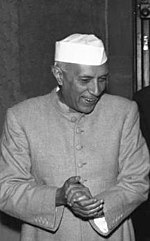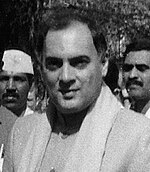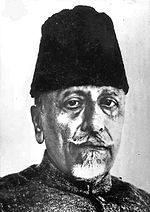BHARAT RATNA RECIPIENTS

On 2 January 1954, a press communique was released from the office of the secretary to the President of India to institute two civilian awards—Bharat Ratna and the three-tier Padma Vibhushan, classified into "Pahela Warg" (Class I), "Dusra Warg" (Class II), and "Tisra Warg" (Class III).[2] The Bharat Ratna is termed as the highest civilian award of India, followed by Padma Vibhushan classifications. A year later on 15 January 1955, the Padma Vibhushan classifications were altered into three different awards; the Padma Vibhushan, the highest of three awards followed by the Padma Bhushan and the Padma Shri.[3]
There is no formal provision that recipients of the Bharat Ratna should be Indian citizens. It has been awarded to anaturalised Indian citizen, Mother Teresa in 1980, and to two non-Indians, Khan Abdul Ghaffar Khan—a Pakistan national, in 1987 and Nelson Mandela—a South African national, in 1990.[4] Sachin Tendulkar, at the age of 40, became the youngest person and first sportsperson to receive the honour,[5] whereas Dhondo Keshav Karve was awarded on his 100th birthday on 18 April 1958 in a special ceremony.[6][a] Till 2014, the award has been conferred upon 43 people with 11 posthumous declarations.[9][10]
List of recipients[edit]
# Naturalized citizen recipient
|
| Year | Image | Laureates | Notes | Refs. | |
|---|---|---|---|---|---|
| 1954 |  | C. Rajagopalachari | Independence activist, last and the only Indian Governor-General of India | [23] | |
 | C. V. Raman | Nobel laureate physicist (1930) | [24][25] | ||
 | Sarvepalli Radhakrishnan | Philosopher, India's first Vice-President (1952–62), and secondPresident (1962–67) | [26][27][28] | ||
| 1955 | – | Bhagwan Das | Independence activist, theosophist, and founder of Mahatma Gandhi Kashi Vidyapith | [29] | |
| – | Visvesvaraya | Civil engineer, Diwan of Mysore (1912–18), and Knight Commander of the Indian Empire | [30][31] | ||
 | Jawaharlal Nehru | Independence activist, author, and first Prime Minister of India (1947–64) | [32][33] | ||
| 1957 | – | Govind Ballabh Pant | Independence activist, first Chief Minister of Uttar Pradesh(1950–54) | [34][35] | |
| 1958 | – | Dhondo Keshav Karve | Social reformer | [36] | |
| 1961 | – | Bidhan Chandra Roy | Physician-Surgeon and second Chief Minister of West Bengal(1948–62) | [37][38] | |
| – | Purushottam Das Tandon | Independence activist, educator | [39] | ||
| 1962 |  | Rajendra Prasad | Independence activist, lawyer, first President of India (1950–62) | [27][40] | |
| 1963 | – | Zakir Hussain | Independence activist, second Vice-President of India (1950–62), and third President of India (1962–67) | [27][28][41] | |
| – | Pandurang Vaman Kane | Indologist and Sanskrit scholar | [42] | ||
| 1966 |  | Lal Bahadur Shastri | Independence activist and second Prime Minister of India (1964–67) | [33][42] | |
| 1971 |  | Indira Gandhi | Former Prime Minister of India (1966–77, 1980–84) | [33] | |
| 1975 | – | V. V. Giri | Trade unionist, first Acting President of India, and fourth President of India (1969–74) | [27][43] | |
| 1976 | – | K. Kamaraj | Independence activist and former Chief Minister of Tamil Nadu(1954–57, 1957–62, 1962–63) | [44] | |
| 1980 |  | Mother Teresa | # | Catholic nun, founder of the Missionaries of Charity and Nobel peace prize laureate (1979) | [45] |
| 1983 | – | Vinoba Bhave | Independence activist, social reformer, and Ramon Magsaysay Award laureate (1958) | [4][46] | |
| 1987 |  | Khan Abdul Ghaffar Khan | Independence activist | [47] | |
| 1988 |  | M. G. Ramachandran | Film actor and former Chief Minister of Tamil Nadu (1977–80, 1980–84, 1985–87) | [44][c] | |
| 1990 |  | B. R. Ambedkar | Chief architect of the Indian Constitution and social reformer | [49][50] | |
 | Nelson Mandela | Leader of the Anti-Apartheid Movement in South Africa andNobel Peace Prize laureate (1993) | [51] | ||
| 1991 |  | Rajiv Gandhi | Sixth Prime Minister of India (1984–89) | [33] | |
 | Vallabhbhai Patel | Independence activist and first Deputy Prime Minister of India(1947–50) | [52] | ||
 | Morarji Desai | Independence activist and fourth Prime Minister of India (1977–79) | [33][d] | ||
| 1992 |  | Abul Kalam Azad | Independence activist | [54][e] | |
| – | J. R. D. Tata | Industrialist and philanthropist | [4] | ||
 | Satyajit Ray | Filmmaker | [4] | ||
| 1997 | – | Gulzarilal Nanda | Independence activist and two times interim Prime Minister of India | [33] | |
| – | Aruna Asaf Ali | Independence activist | [58] | ||
 | A. P. J. Abdul Kalam | Aerospace and Defense Scientist, eleventh President of India (2002–07) | [27][59] | ||
| 1998 |  | M. S. Subbulakshmi | Carnatic classical vocalist | [60] | |
| – | Chidambaram Subramaniam | Independence activist and former Minister of Agriculture of India (1964–66) | [61] | ||
| 1999 | – | Jayaprakash Narayan | Independence activist and social reformer | [62] | |
 | Ravi Shankar | Hindustani classical Sitar player | [63] | ||
 | Amartya Sen | Nobel laureate economist (1998) | [64] | ||
 | Gopinath Bordoloi | Independence activist, first Chief Minister of Assam (1946–50) | [65] | ||
| 2001 |  | Lata Mangeshkar | Playback singer | [66] | |
 | Bismillah Khan | Hindustani classical Shehnai player | [67] | ||
| 2008 |  | Bhimsen Joshi | Hindustani classical vocalist | [68][69] | |
| 2013 |  | C. N. R. Rao | Chemist | [10] | |
 | Sachin Tendulkar | Cricketer | [10] | ||
No comments:
Post a Comment